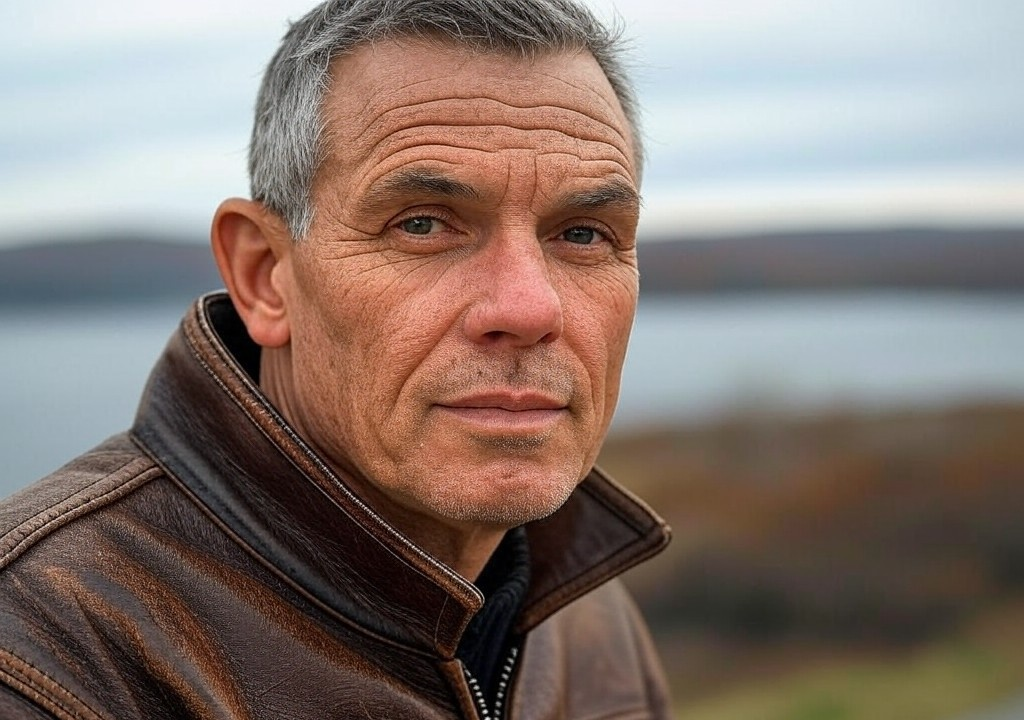It all started on an unseasonably warm Tuesday afternoon in February—one of those days that tricks you into thinking spring is just around the corner, only for winter to barrel back in with a vengeance. I was standing in line at the post office in my coastal Maine town, holding a battered package of books wrapped in more duct tape than was probably necessary. The lines here are long, the pace leisurely, and the Wi-Fi nonexistent, so I made a game of people-watching. That’s when I noticed him.
He was older, definitely in his seventies, with white hair that stood on end like he’d been caught in a wind tunnel. He wasn’t dressed for Maine winter, wearing just a thin flannel shirt and scuffed-up boots that had seen a lifetime of hard labor. Slung over one shoulder was a canvas bag with the words LIFE IS TOO SHORT FOR BAD COFFEE stitched on it, and immediately I knew—this was my kind of guy.
As the line inched forward, he caught me looking and winked, like we were co-conspirators in some unspoken plan. “Packages look heavy,” he said by way of greeting, nodding toward my awkwardly wrapped parcel. “Books?”
I told him they were, and we launched into a conversation so fluid it felt like we’d known each other for years. Turns out, he was a retired boatbuilder named Gus. He’d spent his life crafting things—boats, furniture, relationships. In fact, Gus claimed to be something of an expert in matters of the heart, tossing out lines like: “Building a boat is like building a relationship. You’ve got to pick the right material, give it time, and stay ready for the storms.”
Gus didn’t look at me like you’d expect strangers to in a post office line. He looked at me with purpose, like he’d decided he was going to teach me something in our brief interaction. And he did.
Love Lessons from a Seventy-Something Stranger
As someone who’s spent the better part of my life trying to figure out what makes relationships float or sink, Gus's wisdom hit me square between the eyes. Sure, I’ve read the books, listened to the podcasts, and even written one or two articles going on (and on) about how to navigate love, but Gus had this way of boiling it all down to its essence. These are the lessons I took from that short but memorable conversation.
1. Your Foundation Matters More Than Your Fluff
Gus talked a lot about keelboats and how you need a solid keel to keep the whole thing from tipping over. “You can have all the fancy bells and whistles on top," he said, "but if the foundation’s garbage, you’re sunk.”
Turns out, this applies to love, too. The bells and whistles might be witty texts, grand gestures, or a perfectly curated Instagram feed of your romantic escapades, but beneath all of that, the foundation has to be solid. Are you honest with each other? Can you handle each other’s weird quirks? Are you both in it for the right reasons?
Honestly, it’s like trying to build a house on wet sand. It doesn’t matter how “cute” you are together if the integrity isn’t there to hold you up when things get tough. Gus had a way of cutting through all the noise, reminding me that gimmicks don’t make a relationship lasting—commitment and authenticity do.
2. Storms Aren’t a Matter of If, but When
“People act surprised when trouble comes, but I’ve never met a sailor who didn’t expect rough waters eventually,” Gus said. Then he laughed and added, “What matters is whether the boat’s ready for it.”
Talk about hitting the nail on the head. We tend to get swept up in the early stages of relationships—the thrill of flirtation, the excitement of first dates, the novelty of learning what their go-to pizza topping says about their soul. But most relationships will, at some point, face a test. It’s in those moments you find out what it’s really made of.
Things will happen—someone will lose a job, family tensions will arise, or you'll be forced into a brutal all-nighter to assemble IKEA furniture together. When those moments show up, the question isn’t “Why is this happening?” It’s “How can we work together to weather it?”
Gus’s reminder to expect storms made me think differently—not fearfully, but practically. Are the relationships in my life ready for the inevitable waves, or am I boarding a leaky canoe without so much as a bucket to bail with?
3. Balance Is the Key to Smooth Sailing
Gus said his proudest achievement as a builder wasn’t the biggest boat he’d crafted but the most balanced one. “It was as smooth as a Sunday afternoon on calm waters,” he said, a far-off look in his eye. “Didn’t lean too far one way or the other. Just glided.”
That made me think about how easy it is to tip the scales in relationships. One person gives too much while the other takes too much. Or one person shares their every thought while the other stays locked up like a diary with a missing key.
Balance might sound like another way of saying “compromise,” but it’s more nuanced than that. It’s about mutual—not equal—effort. It’s about making space for both people to be supported without one person feeling drained. Gus’s smooth-sailing boat metaphor has been bouncing around in my head ever since.
4. Never Underestimate the Power of Small Repairs
This was my favorite nugget of Gus’s advice. He told me about a friend who once refused to patch a small crack in their boat, thinking it was too minuscule to cause any trouble. “Two weeks later, that boat was at the bottom of the bay,” Gus said with a shrug.
I couldn’t help but laugh because, oof, too relatable, right? How many small cracks do we let sit in our relationships, thinking they’re too tiny to worry about? A petty argument, forgetting to say thank you, skipping your usual check-in conversations because you’re both too tired—none of them feel like big enough issues to cause a wreck. Until they do.
The takeaway? Make the small repairs now. Apologize first. Speak up when something’s bothering you. Reinforce the good stuff as often as you can. Better to patch the cracks before you’re bailing water, or worse, sinking altogether.
The Guy You’ll Never Find on Dating Apps
Gus and I only talked for twenty minutes, tops—just enough time for me to send off my book package and for him to mail what looked like a stack of homemade postcards. But in those twenty minutes, he managed to leave me with something I’d been searching for: clarity. It’s funny how wisdom often comes from the most unexpected places, like a retired boatbuilder with unkempt hair and a coffee bag slung over his shoulder.
Sure, there are experts and guidebooks aplenty, but Gus wasn’t trying to “fix” anyone’s love life with a long list of steps or rules. He was just telling me what had worked for him, and I think there’s something so powerful about that. He reminded me that love isn’t about drama or grand statements—it’s about craftsmanship, slow and steady, with room for patchwork and patience.
As I walked out of the post office that day, I waved goodbye to Gus. “Good luck with your books,” he called after me. “Remember, relationships and boats—they’re worth it, even when they’re hard. Just make sure it doesn’t sink, kid.”
And man, if I ever launch a love boat of my own, I hope it’s got a little of Gus’s handiwork built in.




















